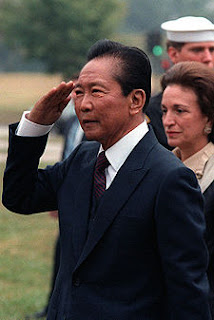
Photo Taken From:
Ferdinand Edralin Marcos - 10th President of the Philippines
Term of Office - 1965 to 1986 ( 20 years )
Presided over more or less 60 million Filipinos

Photo Taken From:
Deng Xiaoping - 5th General Secretary of the Communist Party of China, 3rd Chairman of the Central Military Commission of CCP
Terms of Office - 1956 to 1966, General Secretary of the Communist Party of China; 1977 to 1989, de-facto leader of China ( 22 years )
Presided over more or less 1 billion Chinese
Mr. Marcos and Mr. Deng were both dictators who held power for about the same length of time. They were the undisputed strongmen over the Philippines and China, respectively, for the better part of two decades. During their terms of office, they instituted reforms in their jurisdictions which would greatly influence the destinies of two nations.
Ferdinand Marcos commands a large following among Pinoys as "the greatest President of the Republic of the Philippines". He was possessed of acute intelligence, charisma, and political savvy. According to Wikipedia, "As Philippine president and strongman, his greatest achievement was in the fields of infrastructure development and international diplomacy." Millions upon millions of Pinoys grow nostalgic over Marcos presidency, tirelessly repeating anecdotes about how it was the best period in the Philippines' history.

Photo Taken From:
Mr. Deng is equally revered in his native China as a spectacularly influential personality. According to Wikipedia: "Inheriting a China wrought with social and institutional woes left over from the devastating Cultural Revolution and other mass political movements of the Mao era, Deng was the core of the second generation Chinese leadership. He was instrumental in introducing a new brand of socialist thinking, having developed Socialism with Chinese characteristics and Chinese economic reform, also known as the socialist market economy and partially opened China to the global market. He is generally credited with advancing China into becoming one of the fastest growing economies in the world and vastly raising the standard of living. "
Obviously, Mr. Deng had ushered in an unprecedented period of progress in China.

Photo Taken From:
Both of them had their own share of the blunt criticisms. Wikipedia states that the Marcos administration "was marred by massive authoritarian government corruption, despotism, nepotism, political repression and human rights violations".
Mr. Deng, on the other hand, was recently the subject of an inflammatory essay by Bao Tong, a high-ranking Chinese official. According to an article that appeared on the British news website TimesOnline, Mr. Bao indicates that "Deng turned against political liberalism and backed rule by a strong state. He [ Bao ] argues that the party has merely transferred economic privilege to a corrupt bureaucratic elite. 'The price we have paid for it today has been too steep: a cheap labor force, added to massive plunder of natural resources, poisoned air and polluted water,' Bao writes. " Mr. Deng is also perceived, perhaps correctly, as the highest official who gave the go-ahead for the Chinese military to kill thousands of civilians during the infamous Tiananmen Square Massacre.
It seems that both leaders had promulgated policies which were both highly praised by some quarters and reviled by others.
Could it be reasoned that Mr. Marcos and Mr. Deng were somehow on the same league?
And yet, there is a marked difference between how the Philippines has floundered after Mr. Marcos relinquished his stewardship, and how China emerged as a world superpower after Mr. Deng stepped down from power.
In an article by CNN's Beijing Bureau Chief Jaime FlorCruz, he states that: "China now is nothing short of an economic miracle. Its economy has grown at an average of 9.8 percent since 1978, making it the fourth largest economy in the world. Incredibly, China has pulled off the equivalent of reform, renaissance and industrial revolution in 30 years. It's incredible because only three decades ago China was so poor and isolated."
Article Excerpt From:
The Philippines, on the other hand, is described in less savory terms by the British Broadcasting Corporation. According to an article from bbc.com:
"Though it once boasted one of the region's best-performing economies, the Philippines is saddled with a large national debt and tens of millions of people live in poverty. The economy is heavily dependent on the billions of dollars sent home each year by the huge Filipino overseas workforce."
Article Excerpt From:
It would seem that Mr. Marcos left quite a more bitter legacy for his people, while Mr. Deng's pioneering efforts stayed on bearing fruit in China long after he left.
Would this mean that Mr. Deng was the better state leader? Or do the achievements of Mr. Marcos remain over and above those of Mr. Deng's?
What do you think?
No comments:
Post a Comment